After Olympic heartache in Paris, Anna Hall has been learning to fall in love with the heptathlon again
There was a delay of a couple of days but, as the dust settled, the tears came. After announcing that she was undoubtedly back to her best – producing the joint second-highest heptathlon score in history at the Hypomeeting in Götzis – Anna Hall couldn’t keep her emotions in check any longer.
“Any time I've made a big breakthrough, it takes my brain a while to almost catch up to the level that I'm at,” she says. “But it did start to sink in and I got emotional a few days after. It was a really special weekend.”
The performance meant so much because the American has been through so much since slipping on a long jump board in the lead-up to the World Championships two summers ago. Back then, she had just fully burst on to the world heptathlon scene.
Yes, at the age of 21, she had become NCAA champion and also won a world bronze on home turf at Eugene 2022, but a performance of 6988 in Götzis a year later not only secured victory but underlined her credentials as a talent to really be reckoned with. Her second national title followed and everything seemed to be lining up for an attack on a maiden global gold in Budapest.
Around four weeks out from those world championships, however, came that long jump mishap that resulted in “a small tear” in Hall’s PCO – the Posterior Condylar Offset that helps flexion and stability of the knee. The damage wasn’t bad enough to keep her from competing in Hungary, where she finished runner-up after a memorable battle with Britain’s Katarina Johnson-Thompson. However, looking back, it marked the beginning of some long-term troubles.
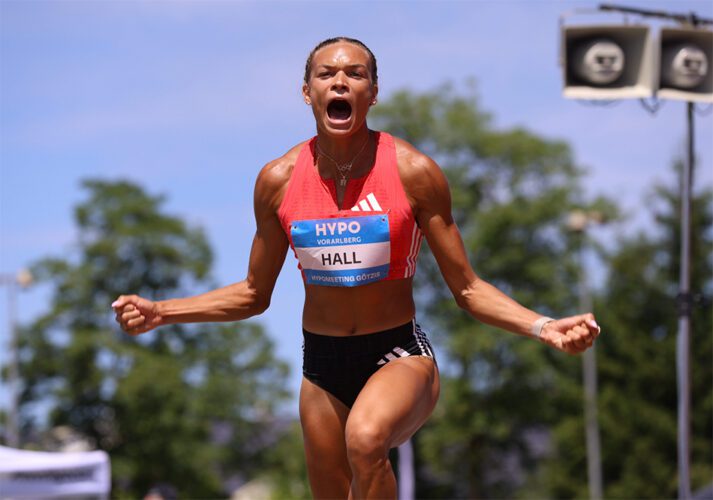
“When we finished Budapest, we took time off, did rehab, all of that stuff. But my knee just kept hurting. It kept swelling,” explains Hall. “I think from all we had done, with my knee constantly being inflamed, it did a lot of damage to the cartilage in my knee. So when I got another MRI [in December 2023], it looked like somebody had taken a knife to all the cartilage in my knee, and I had a stress fracture in my patella from when I would jump. Where there's no cartilage, my femur was hitting the back of my kneecap, so that was causing all the swelling and pain.”
Surgery was needed and, though she is now pain-free, that was certainly not the case as Hall tried to qualify for her first Olympics last year.
“It was so stressful,” she adds. “I didn't really realise how bad it was until the Olympic trials were over, because then I was like: ‘Oh, I can sleep’. In the previous six months, I'd wake up in the middle of the night and be up all night thinking: ‘How am I going to figure out how to run the hurdles well again?’ And that's just not normal. It's not healthy. Looking back to this time last year, we were in full panic mode. I didn't even think I was going to be on the team and, pain-wise, we were definitely doing things before my body was ready to do them.
“We were being safe, but when your body's not ready to do it it's going to hurt, it's going to swell and we were constantly battling that.”
The pain levels meant Hall could not jump “back to back days” and every six weeks she would receive injections of Hyaluronic acid, a natural substance which acts as a cushion and a lubricant in the joints. “I was on pain medication every time I had to high jump,” she says. “It was really just a mess. It was terrible.”
Hall did ultimately make the Paris start line, but it hadn’t exactly been the perfect build-up. Her fifth-place finish left mixed feelings, too.
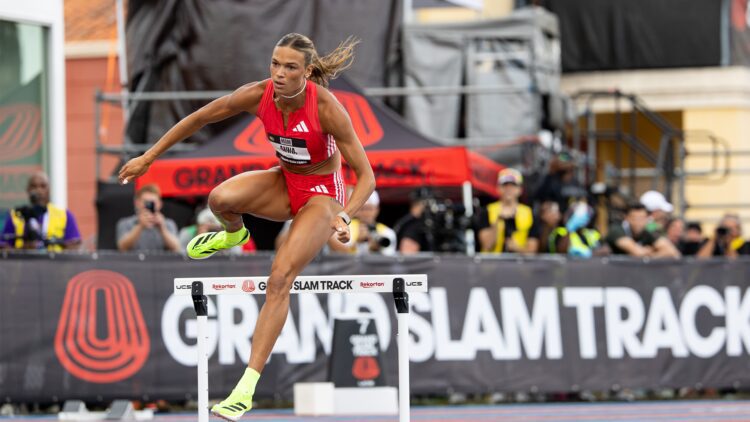
“I'm proud that I got there, I'm proud that I competed hard,” she says. “But, on the other hand, my knee was strong enough to get through seven events, so I think I should have been able to compete for the podium and I didn't. It's a little bit of a failure as well, so I think it's just making peace with that.
“I can think that I should have done better, but also I'm proud of the fact that I got there at all and, looking forward, it definitely taught me a lot about my body.”
The whole process was instructive when it came to Hall’s mental resilience, too. The scars left by that knee injury were not just physical.

“I stopped having pain a while ago – December, January, time – and it was like: ‘Okay, now we're able to train at the level we need to without pain, swelling, all those things’,” she says. “But, even after that, it was still in my head and it was lingering. I didn't feel like the same athlete any more and I think I honestly didn't snap out of that until the high jump at Götzis.”
Hall and her coaching team had headed to the event with expectations of something solid rather than spectacular. “My coach and I had talked about 6750,” she says. A meeting record – and becoming just the fifth member of the 7000 club – was certainly not on the agenda.
In the lead-up, Hall had been “starting to see glimpses of myself, but I still didn't feel like me”. Stepping out in front of a crowd which is famously absorbed in every run, jump and throw helped but, after a 100m hurdles run of 13.19 to start with, it was a high jump PB of 1.95m that flicked the switch.

“Before injury it was very much in my wheelhouse to pull out a big PR in front of a big crowd in a big moment and so, when I did that, I was like: ‘Okay, we're back’,” she smiles.
Another PB of 14.86m followed in the shot put before Hall ended day one with 23.37 in the 200m. Day two began with a 6.44m long jump, then a 46.16m javelin PB, before storming home with a 2:01.23 800m PB to complete the job.
“It felt so good and it gave me so much confidence because I've had to learn so much about my body in the times when it wasn't doing what I was asking it to do and now I'm not fighting myself any more,” she says. “[Now it’s the case that] this is going to be so easy, because I've had to figure out how to still throw the shot put far with technique when my body doesn't want to, and I've had to figure out how to do these things when I don't feel good. But then I was like: ‘I'm explosive again. My body's responding and now I have all of this technical background that I've been working and working and working at’. It made me feel indestructible. I was like: ‘I can't lose’.”
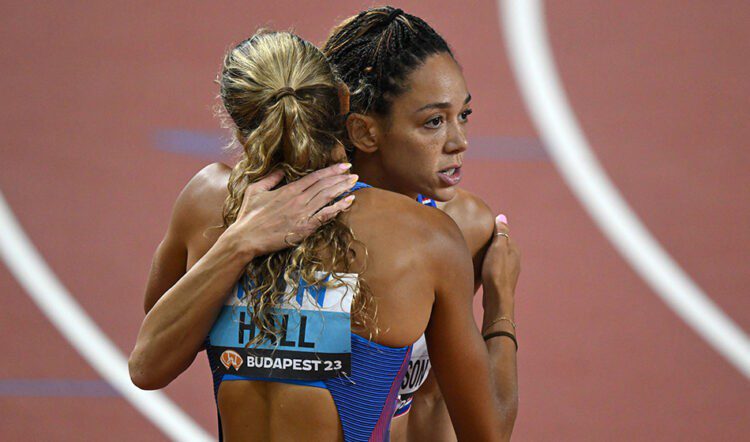
That freedom laid the platform for Hall's Götzis brilliance, a performance that attracted some high praise from high places. Consider this social media post from America’s two-time decathlon Olympic champion and former world record-holder Ashton Eaton, for example.
“Pound for pound, Anna Hall might be one of the best athletes on earth right now,” he wrote.
Those comments didn’t escape Hall’s attention, so how did they make her feel?
“Any time Ashton Eaton opens his mouth about anything related to the multi-events, especially me, I'm going to listen,” she says. “But, honestly, with that comment I was just like: ‘Okay, slow down’. It was definitely very nice to see, and I was very flattered, but I was like: ‘I've got a lot to do before I earn that title’. But this was definitely a good start.”
There is likely to be more hype following this young woman throughout another Olympic cycle that will come to a head in Los Angeles in 2028 and Hall freely admits those Games are “definitely on my mind”. Any post-Paris trepidation has been replaced by keen anticipation about what lies ahead, however.
“At LA I'll be 27 and most people's best scores or records have been set the year that they were 27 so hopefully that is speaking something into existence,” she adds. “I'm super excited to have a Games at home and I think, knowing what I know now, and having been there at the Olympics before, I am excited about having three years to prepare and truly step into LA knowing that I'm ready.
“If there's one thing America loves, it is winners so I think, for the greater good of track and field, maybe everyone should hope that Team USA has a strong showing in LA, because I think that will really resonate with the American audience.”
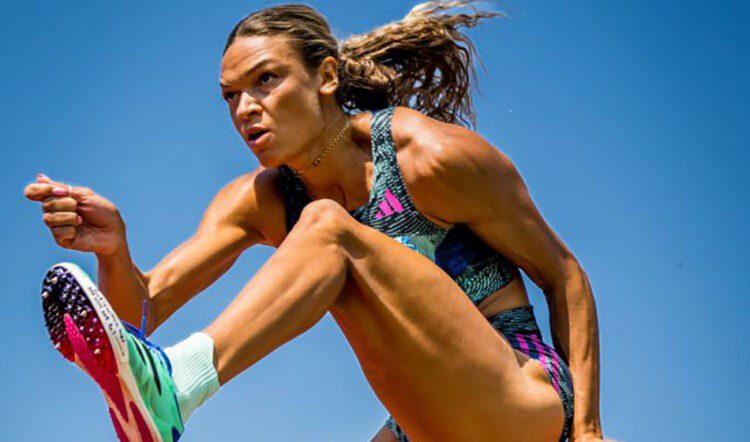
Should Hall fulfil her aspirations, it would make her the first American to land the Olympic heptathlon gold since Jackie Joyner-Kersee, who also set what remains the world record of 7291, at the Seoul Games of 1988. Javelin specifications have been changed in the intervening years, making it an even harder target to hit, and though Hall believes she may well be capable of achieving it, she won’t be rushing any attempts to succeed a woman who has become a friend as well as a mentor.
“We are very close and I'm very, very thankful for that relationship,” says Hall. “We text a lot and she texted me before the heptathlon [in Götzis]. Then she called my coach so that I could talk to her before the awards presentation.
“The heptathlon is traditionally won by Europeans and she's like: ‘You go and prove to them that America makes heptathletes’. That's something that we've bonded over, and hopefully I can do right by her and help bring a heptathlon gold back to the States.
“I want to [break the world record] as much as everyone else wants to see it, but me focusing on that all the time is not going to help us get there the same way. It might happen on its own, but I'm definitely not going to be chasing it down any faster just because it's something that the media wants to see.
“It's going to take a lot of development from me in a lot of events and I just know that that takes time. I think I'm capable, but it takes time. It takes the perfect day, it takes the right conditions and a little bit of luck.”
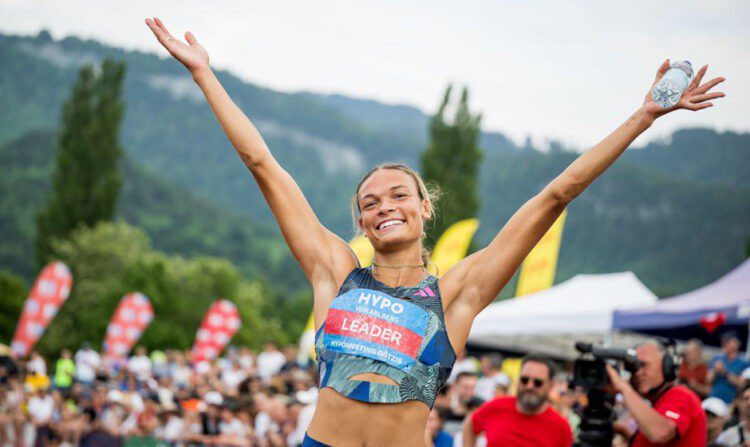
The mind of a heptathlete can be a busy place. Having seven disciplines to worry about means there are seven lots of cues, seven lots of processes and seven lots of techniques to consider alongside the inevitable ups and downs of a competition that takes two days to complete.
With so much to think about, then, Hall finds it useful to let her journal take some of the strain. “I write down three things that I can focus on in each event,” she says. “Those are the three things that I know: ‘If you do those things, it will go well’, and that helps me focus those.
“I spend all morning of day one thinking about the 100m hurdles [the heptathlon’s opening discipline], and then you might just forget whatever cue you are going to think about for the high jump by the time you're through your hurdles warm-up. I don't want to be just at the whim of my memory and remembering cues, so it's very helpful to write those down. In between each event, I take a look at that, and I relook at it like: ‘What am I trying to do in this event to stay centred?’”
She adds: “The type of athlete that I am is pretty creative. I'm very much a feel person. I could be physically ready to do something, but if I don't have the feel of it then it's very hard for me to put it together. Every event for me, there's a rhythmic flow to it. There are words I say to myself or a certain tempo [I’m looking for].
“I'm not sure that everybody views every event as rhythmically as I do. I count everything, so in my high jump approach, I say: ‘One, two, turn, go left, right, left’. And I say that to myself every single time. There's a certain tempo in my head.
“I do that in the long jump. I do that in the hurdles and all these events where most people, I think, don't necessarily have time, or take the time, to count what's going on. But, for me, it's very repeatable. Once I work out the tempo of whatever is a good jump and whatever is correct, then I know it's in my brain for good.
“The biggest thing the journal does is let me pick which thoughts to listen to. I'm not going to write down: ‘The long jump is terrifying, I don't want to take off’. I'm writing down things like: ‘My knee is strong enough to do it. I know how to do this’, and those types of things. I'm having both [negative and positive] thoughts in my head but I think it helps me definitively say: ‘I'm choosing these thoughts instead of those’, which I think is why it's very powerful.”
There was power, too, in the performance that brought those tears.
“Coming off the Olympics, I was so heartbroken and I definitely had that post-Olympics comedown where I was just kind of sad all the time and training was hard,” says Hall. “I went to practice every day, did everything I was supposed to do, but I just wasn't excited about it any more. I was wondering: ‘Is my knee going to hurt forever? And am I ever going like this again?’
“Now I have the final answer to both of those things. ‘You will enjoy this again’, and ‘your knee will not hurt forever’. There were definitely a few months where I couldn't have seen this happen at all.
“It taught me a lot about my toughness as an athlete and I think scoring 7000 points ‘by accident’ has also taught me where I should be a little bit more careful, because if we're just healthy, we'll be okay.”
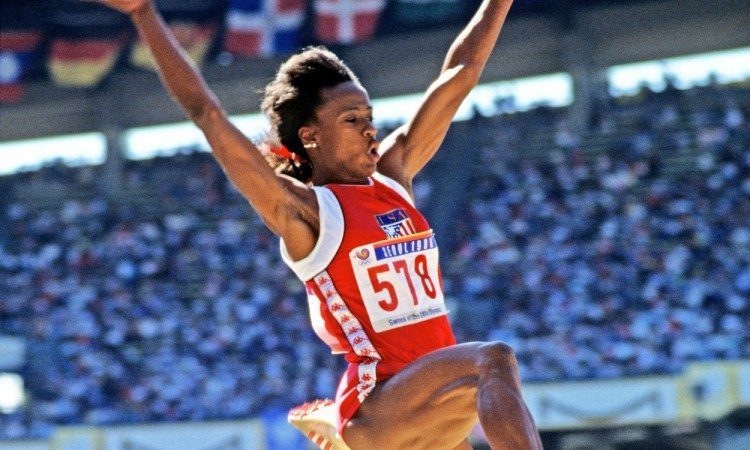
The 7000 club
7291 Jackie Joyner-Kersee (USA)
Seoul, Sept 24, 1988
(12.69/+0.8 - 1.86m - 15.80m - 22.56/+1.6 / 7.27m/+0.7 - 45.66m - 2:08.51 )
7032 Carolina Klüft (SWE)
Osaka, August 26, 2007
(13.15/+0.1 - 1.95m - 14.81m - 23.38/+0.3 / 6.85m/+1.0 - 47.98m - 2:12.56 )
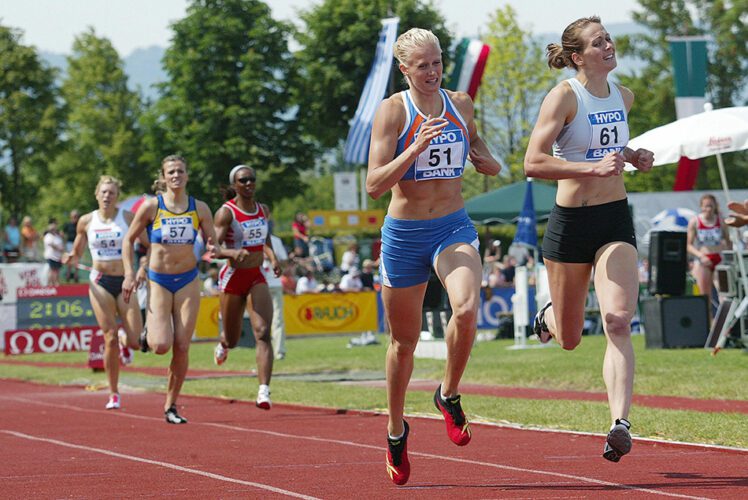
7032 Anna Hall (USA)
Götzis, June 1, 2025
(13.19/-1.0 - 1.95m - 14.86m - 23.37/+0.5 / 6.44m/-0.1 - 46.16m - 2:01.23)
7013 Nafissatou Thiam (BEL)
Götzis, May 28, 2017
(13.34/-0.7 - 1.98m - 14.51m - 24.40/-1.6 / 6.56m/+0.8 - 59.32m - 2:15.24)
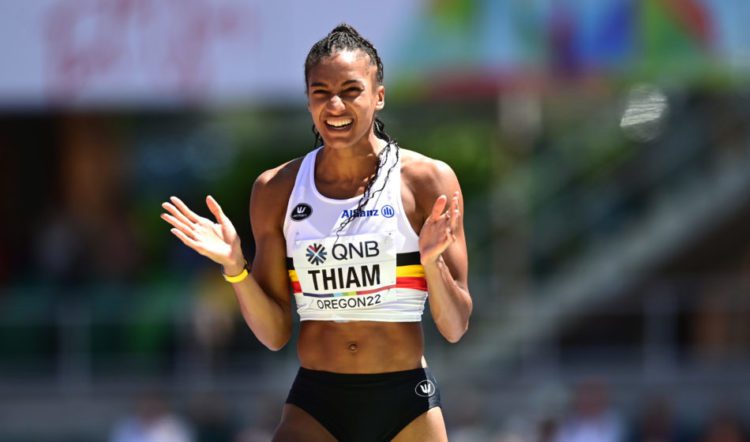
7007 Larisa Nikitina (URS)
Bryansk, June 11, 1989
(13.40/+1.4 - 1.89m - 16.45m - 23.97/+1.1 / 6.73m/+4.0 - 53.94m - 2:15.31)
